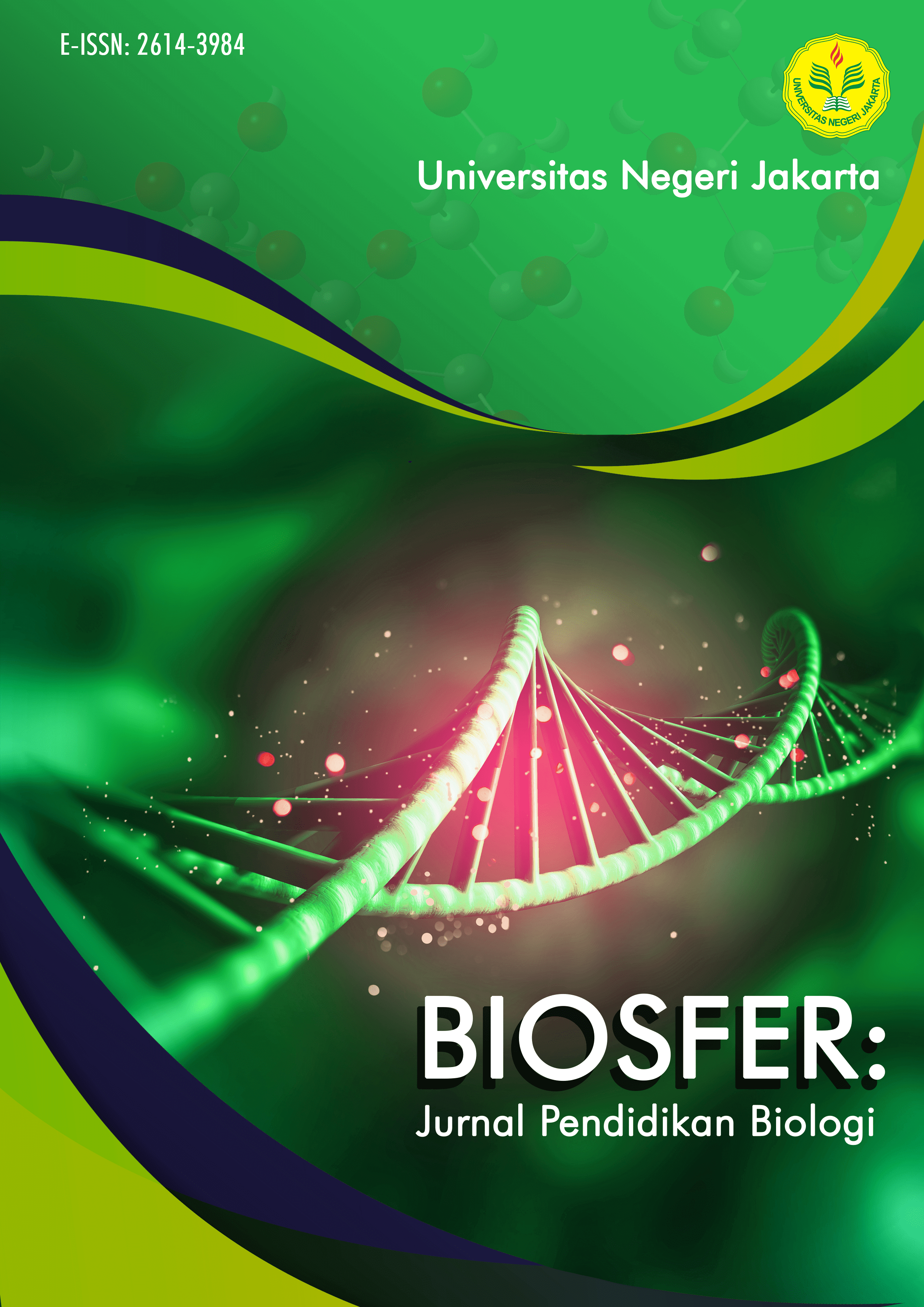Effects of the problem-based learning model assisted by mind mapping on the science learning outcomes of junior high school students
DOI:
https://doi.org/10.21009/biosferjpb.47526Keywords:
Learning model, Learning outcome, Pbl, Science learningAbstract
Science learning is an effort to discover scientific truths through a series of thought processes. The demands of 21st-century science learning are learning that develops students' thinking skills. One learning model that is expected to train students' thinking skills is problem-based learning (PBL). This research aims to analyze the influence of the PBL learning model assisted by mind mapping on the science learning outcomes of class VII students at SMP Muhammadiyah 8 Surakarta for the 2022/2023 academic year. This research is a quasi-experimental research with a non-equivalent control group design. Samples were taken randomly, with 1 class as the control class and 1 class as the experimental class. The learning outcomes analyzed include cognitive, affective, and psychomotor learning outcomes. Data analysis was carried out using an independent sample t-test. Based on the research and data analysis results, there is a significant influence of the application of the PBL learning model assisted by mind mapping on students' science learning outcomes.
References
Agustin, N. D. (2021). Efforts to Improve Learning Outcomes Using a Problem Based Learning (PBL) Model for Fifth Grade Elementary School Students. SHEs: Conference Series, 4(5), 696–700. https://doi.org/10.20961/shes.v4i5.66076
Aidah, C. (2022). The Influence of Problem Based Learning and Mind Mapping Models on Learning Outcomes Indonesian Language Students of Class X at SMAN Pakusari. Journal of Educational Technology and Innovation, 5(2), 12–16. https://doi.org/10.31537/jeti.v5i2.967
Anratriningrum, R. A., Sutarto, J., & Edy Mulyono, S. (2020). The Effect of Mind Mapping-Assisted Problem-Based Learning (PBL) Model on Science Process Skills of Fifth Graders. Journal of Primary Education, 9(5), 527–535. https://doi.org/10.15294/jpe.v9i5.43266
Areeisty, K., Hasanuddin, & Sarong, M. A. (2020). The implementation of problem-based learning with mind mapping to improve students’ learning motivation. Journal of Physics: Conference Series, 1460(1). https://doi.org/10.1088/1742-6596/1460/1/012061
Aslam, L. K., Suparji, S., & Rijanto, T. (2021). The effect of problem based learning model on learning outcomes in the vocational high school students. International Journal for Educational and Vocational Studies, 3(4), 264. https://doi.org/10.29103/ijevs.v3i4.3958
Astiningtyas, D., Wardani, K. W., & Triastuti, R. (2023). Implementation of Mind Mapping-Assisted Problem-Based Learning Model to Improve Social Science Learning Outcomes for Students at Class 5B of SD Kristen 03 Eben Haezer Salatiga. Primary: Jurnal Pendidikan Guru Sekolah Dasar, 12(3), 595–603. http://dx.doi.org/10.33578/jpfkip.v12i3.9826
Cerkez, Y., Alkim, N. T., & Sorakm, Y. (2023). Beyond Traditional Note-Taking: High School Students Attitudes Toward Mind Map. Pegem Journal of Education and Instruction, 14(1), 52–59. https://doi.org/10.47750/pegegog.14.01.06
Devyana Sukma Dewi, V., & Bayu Sangka, K. (2022). The Influence of PBL Integrated with Mind Mapping on the Student’s Learning Outcomes. International Journal of Innovation, Creativity and Change. Www.Ijicc.Net, 16(3), 2022. www.ijicc.net
Dewi, A. K. (2019). Improving Students Learning Outcomes Through Mind Map in Human Reproductive System Topic in Natural Science Learning. International Journal for Educational and Vocational Studies, 1(7), 702–706. https://doi.org/10.29103/ijevs.v1i7.1675
Dharma, B. A., Tasrikah, N., & Churiyah, M. (2020). Effectiveness of Problem Based Learning (PBL) Towards Learning Outcomes Through Critical Thinking Skills. Jurnal Ad’ministrare, 7(2), 235. https://doi.org/10.26858/ja.v7i2.15343
Indrawati, E. S., & Nurpatri, Y. (2022). Problematika Pembelajaran IPA Terpadu (Kendala Guru Dalam Pengajaran IPA Terpadu). Educativo: Jurnal Pendidikan, 1(1), 226–234. https://doi.org/10.56248/educativo.v1i1.31
Karo-Karo, S., Restuati, M., & Silaban, R. (2017). The effects of problem-based learning with mind mapping to enhance students’ creative thinking skills and learning outcomes. Journal of Education and Practice, 8(27), 180–185. www.iiste.org
Muharam, U. R., Prasetyorini, & Jaenudin, D. (2020). Problem Based Learning Dengan Strategi Mind Map pada Materi Ekosistem Untuk Meningkatkan Hasil Belajar Siswa. Jurnal Pendidikan Dan Pengajaran Sekolah Dasar (JPPGuseda), 03(02), 98–102. https://doi.org/10.55215/jppguseda.v3i2.2547
Nurtamara, L., & Widyastuti, D. A. (2023). Improving evidence-based argumentation on socioscientific issues through problem-based learning in science students. Biosfer, 16(2), 439–446. https://doi.org/10.21009/biosferjpb.35534
Nuryati, I. D., Sunardi, Anitah W, S., & Gunarhadi. (2018). Effectiveness of PBL through Concept Map to Improve Problem Solving Skills of Primary School Students. International Journal of Educational Technology and Learning, 2(2), 41–47. https://doi.org/10.20448/2003.22.41.47
Raharjo, H., Khairudin, M., & Baser, J. A. (2018). The Influence of Problem-Based Learning and Direct Teaching on Students’ Learning Outcomes. Jurnal Pendidikan Teknologi Dan Kejuruan, 24(1), 62–71. https://doi.org/10.21831/jptk.v24i1.18015
Rusmana, A. N., & Wahidah, S. K. (2016). Aplikasi Hakikat Sains dalam Perencanaan dan Pengelolaan Pembelajaran IPA di Indonesia: Sebuah Kajian Literatur. KONFERENSI NASIONAL ICES, At IAIN Walisongo, Jawa Tengah, August.
Setyaningsih, E., Agustina, P., Anif, S., Ahmad, C. N. C., Sofyan, I., Saputra, A., Salleh, W. N. W. M., Shodiq, D. E., Rahayu, S., & Hidayat, M. L. (2022). PBL-STEM Modul Feasibility Test for Preservice Biology Teacher. Indonesian Journal on Learning and Advanced Education (IJOLAE), 4(2), 118–127. https://doi.org/10.23917/ijolae.v4i2.15980
Siswati, S., Giatri, E., Rizal, F., & Giatman, M. (2021). Implementation of Problem-Based Learning Using Mind Mapping and a Growth Mindset in the Covid-19 Pandemic Situation. Proceedings of the 8th International Conference on Technical and Vocational Education and Training (ICTVET 2021), 608(Ictvet), 72–78. https://www.atlantis-press.com/proceedings/ictvet-21/125965551
Sudarisman, S. (2015). Memahami Hakikat dan Karakteristik Pembelajaran Biologi dalam Upaya Menjawab Tantangan Abad 21 serta Optimalisasi Implementasi Kurikulum 2013. Jurnal Florea, 2(1), 29–35. https://doi.org/10.25273/florea.v2i1.403
Sulistia, D., & Anshor, A. S. (2023). The Influence of Problem Based Learning (PBL) Model on Student Learning Outcomes in Mathematics Learning Materials Building Cube Space and Beam in Class V SDN 060907 Medan Maimun District. International Journal of Educational Research Excellence (IJERE), 2(2), 173–178. https://doi.org/10.55299/ijere.v2i2.457
Yusniza, Y., Nurmaliah, C., Abdullah, A., Sarong, M. A., & Safrida, S. (2023). Learning Transformation: The Impact of Problem Based Learning with Mind Mapping on Learning Outcomes in Environmental Conservation Lesson. Jurnal Penelitian Pendidikan IPA, 9(9), 7599–7605. https://doi.org/10.29303/jppipa.v9i9.4890
Downloads
Published
How to Cite
Issue
Section
License
Copyright (c) 2025 Biosfer: Jurnal Pendidikan Biologi

This work is licensed under a Creative Commons Attribution 4.0 International License.
The Authors submitting a manuscript do so on the understanding that if accepted for publication, copyright of the article shall be assigned to Biosfer: Jurnal Pendidikan Biologi (Biosferjpb) and Departement of Biology Education, Universitas Negeri Jakarta as publisher of the journal.



